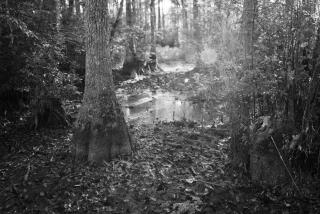An Illuminating Passion for Consumption, Grounded in History
- Share via
On July 12, 1893, a then-obscure history professor named Frederick Jackson Turner delivered a paper--known today as Turner’s thesis--in which he argued that the American character was shaped in large part by a frontier history that had offered to those Americans bold (or ruthless) enough to seize it a seemingly never-ending supply of open land.
I think of Turner as I walk my neighborhood in the evening darkness and see house after house completely lit up, inside and out, in spite of the fact that we languish in a state of energy emergency. I look out to see the San Fernando Valley, filled with an undiminished sea of twinkling lights. I think of Turner because one of the effects of America’s frontier history, he suggested, has been to make us rather profligate with our land and natural resources. Frontier farmers, for example, would cultivate their soil to the point of depletion, watch it blow away in the wind and simply move on to new land farther west because there always seemed to be more land for the taking.
With the perpetual promise of more land, more resources, more everything, Americans have never really learned how to conserve anything. It is a cultural trait that has always puzzled people from less well-supplied countries. William Saroyan, for instance, has written of the dismay with which Armenian immigrants to California once viewed the sheer waste of produce that they saw lying on the ground in the orchards of the Central Valley. And Europeans marvel at the complaints sport-utility vehicle-loving Americans make about gasoline prices when European prices are double ours.
The current energy crisis demonstrates again how powerful an influence our frontier history continues to be and how difficult it is to get us to conserve resources. California’s Christmas lights burned throughout December and early January even as Pacific Gas & Electric and Southern California Edison burned through billions of bankruptcy-threatening dollars. And even now that we have gotten to the point of Stage 3 alerts and rolling blackouts, I see no difference in my own neighborhood, Calabasas, which, incidentally, is on SCE’s grid, not the Los Angeles Department of Water and Power’s.
*
There is a particular irony in this energy crisis that also makes me think of Turner. Part of Turner’s thesis was that by the end of the 19th century the American frontier had effectively run out, and that with no more free land in the offing, the American character would have to change as well, would have to get used to scarcity rather than abundance. But thanks to technology, that change never became necessary. New sources of abundance appeared, with the space age (to mention one particularly glamorous example) offering an infinite new frontier for exploitation and the Internet emerging as an electronic frontier.
But suddenly the electronic frontier, with its center in Silicon Valley, is in trouble. High-tech firms are threatening to abandon the Golden State unless their energy woes are solved, and Wall Street has talked about downgrading California’s credit rating. Words like “catastrophe” and “economic meltdown” appear in descriptions of the threat to the state, and yet unnecessary lights keep burning.
It is both disheartening and predictable--predictable because of our frontier-shaped expectations of unlimited resources and disheartening because significant voluntary conservation could assuage the crisis with the least pain or risk. Some people will object that I am missing the point: that residents of the San Fernando Valley don’t have to conserve electricity because DWP, which serves most of the Valley, has plenty of energy.
But that argument misses two points. First, every kilowatt that the DWP can save can be sold at reasonable rates to other utilities that are being gouged by out-of-state suppliers. And second, even when there is plenty of power available, its generation is always a messy business. It either requires damming wild rivers, polluting the air with coal smoke, threatening everything and everyone with nuclear reactors, cluttering up open hillsides with windmills or simply paying an arm and a leg for natural gas supplies to power the generators.
*
Even in the best of times, we should be sparing with electricity consumption. There is always some price to pay for its generation. But I don’t expect that this will ever happen. Our frontier spirit prompts us to increase supply rather than reduce demand. A full century after Frederick Jackson Turner announced that the frontier had run out, most of us are still looking over the horizon for fresh pastures and more of everything.
